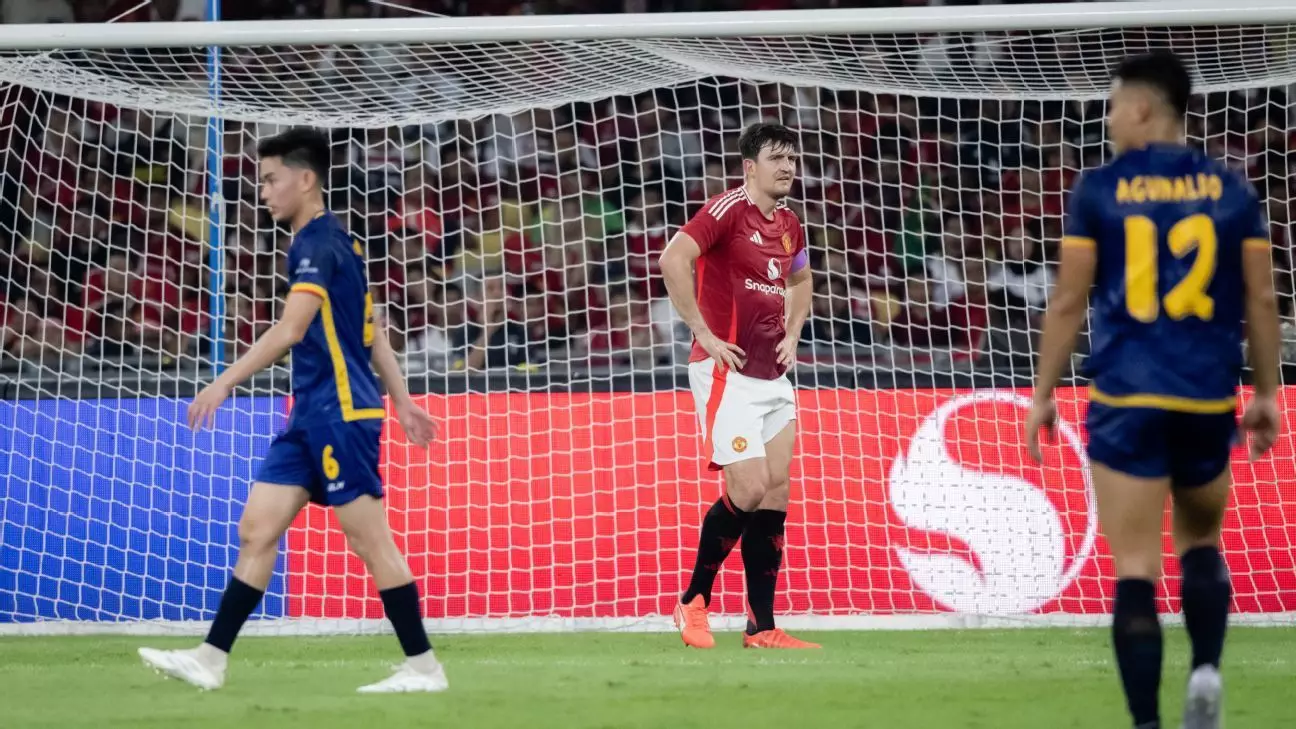In a season that many will remember as an arduous journey marred by mediocrity, Manchester United found their dismal campaign drawing to an even more ignoble close with a staggering 1-0 defeat to the ASEAN All-Stars. This match, touted as a friendly yet symbolically critical, took place at the iconic Bukit Jalil National Stadium in Kuala Lumpur. For a club of Manchester United’s stature, losing to a hastily assembled team of regional stars signifies more than just a bad day at the office; it underscores the magnitude of their current struggles and ongoing descent into a perceived footballing abyss.
On the surface, one could be tempted to dismiss the outcome as an inconsequential friendly match. However, the impact of such losses resonates deeply with the club’s massive global fanbase, many of whom traveled from afar to witness their idols play. The defeat not only stings for the players and coaching staff but also sends shockwaves through a system that is already under intense scrutiny. The word “embarrassment” might even be a kind characterization of the defeat, particularly when one considers United’s illustrious history and expectations.
Fanfare and Financial Gains
Beyond the disappointment of the match’s outcome lies an undeniable truth: Manchester United’s venture into Malaysia carries heavy financial motivations. With a fanbase numbering in the millions worldwide, the club’s tours are often peaks of profitability, as highlighted by CEO Omar Berrada’s own remarks about revenue generation through these fixtures. Reportedly, this Asian trip is set to bolster the club’s coffers by over £8 million. It’s a lucrative business model, yet one that raises questions: Are these high-stakes friendlies promoting genuine competitive spirit, or are they merely cash cows for the club?
Indeed, the allure of Manchester United has not waned among supporters, as evidenced by the 70,000 enthusiastic fans—all draped in their beloved red—who flocked to the stadium. However, it’s essential to ask whether the club is delivering the level of football expected of them in exchange for such loyalty and investment. The stark contrast between the club’s on-field performance and the fervent support from fans is increasingly becoming a dissonant narrative.
All-Stars Rise to the Challenge
The ASEAN All-Stars, although a team assembled relatively quickly and comprised of players from various regional backgrounds, showcased an impressive desire and tenacity throughout the match. Players like Maung Maung Lwin, who netted the decisive goal in the 71st minute, were clearly motivated by the chance to face a globally recognized team like Manchester United. For many players from Southeast Asia, this match served not just as another game but as an opportunity to etch themselves into their countries’ sporting history.
Interestingly, the All-Stars fielded a squad that included less celebrated but intensely driven players. Their determination to seize the moment presented a formidable contrast to the Manchester United side, which paraded their heavyweights, including Casemiro and Bruno Fernandes yet failed to capitalize on their renown. Another notable point is that the region’s best players, such as Chanathip Songkrasin, were absent from the roster, hinting that the All-Stars were not the strongest possible eleven from Southeast Asia. Even with this limitation, the players displayed a will to win that resonated deeply.
Turning Tides of Perception
What was once a routine friendly shifted the spotlight increasingly onto Manchester United’s faltering image. How can a club of their stature lose to a team regarded as ‘lesser’? Questions surrounding coaching strategies, player commitment, and management decisions erupted on social media in the aftermath. As the players left the pitch, even they acknowledged the scale of what had transpired. Instead of reveling in a tailored performance, they were confronted by a passionate fanbase with simmering frustrations.
This loss also raises concerns about the landscape of football in Southeast Asia, providing an opportunity to highlight its growing competitiveness. Days past may have seen Southeast Asian players evolve into mere spoils in the presence of football’s elite, but this match illustrated a different reality. The players wanted to blaze their name onto a global stage, effectively flipping the narrative heat back onto the aging titans from Manchester.
Hence, while Manchester United may have departed Kuala Lumpur with a paycheck lining their pockets, the memory of this defeat will linger long after. The ASEAN All-Stars seized the opportunity and sent a powerful message: football is evolving, and the gulf between the established elite and emerging talent is rapidly narrowing. If Manchester United hopes to recapture their former glory, they will need to address the underlying issues plaguing both the club and its performances.

